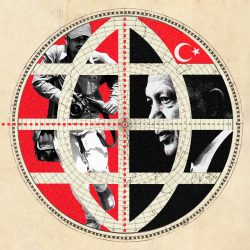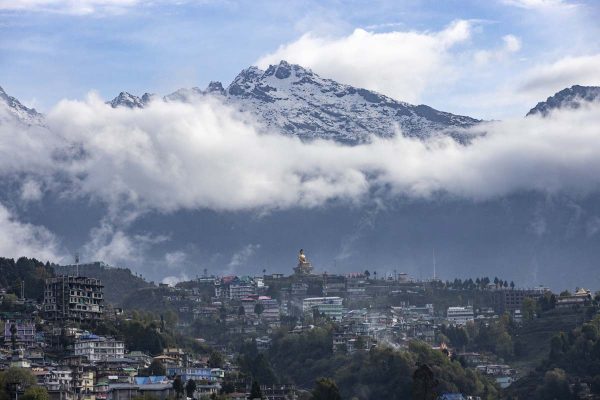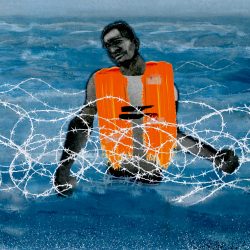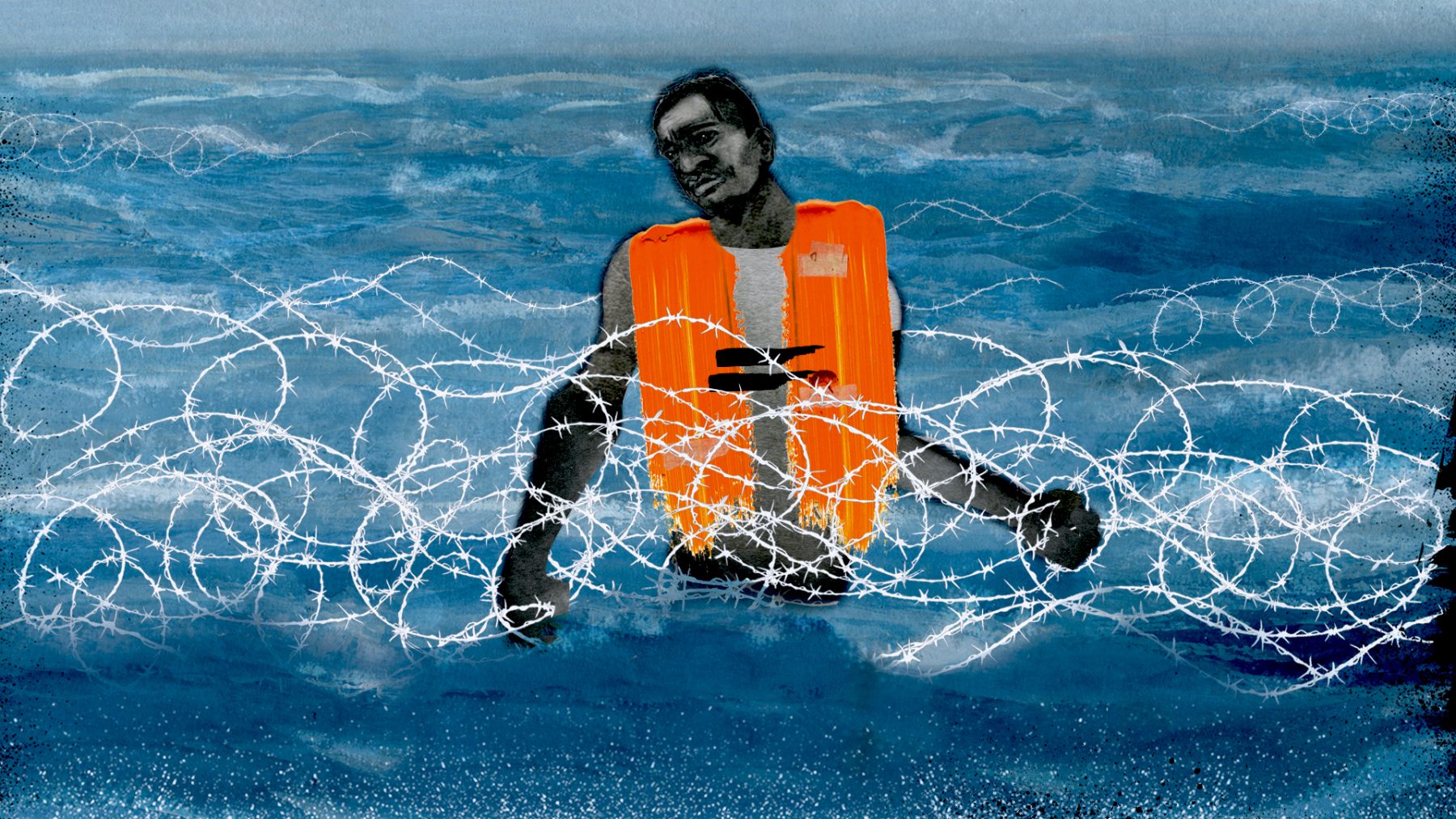
How an EU-funded agency is working to keep migrants from reaching Europe
- By Zach Campbell and Lorenzo D'Agostino
- Illustrations by Ann Kiernan
- feature
When he saw the Tunisian coast guard coming, Fabrice Ngo knew he wouldn’t make it to Italy that day. The young Cameroonian had pushed off from the shore of the Tunisian city of Sfax in a small metal boat with 40 others. They left under the cover of night alongside seven other boats. The small fleet motored north toward Italy, spread out, but all with the same destination. In the distance, the lights of seaside towns dotted the coastline.
The Tunisian coast guard found them two hours into their journey. As the police vessel approached, fear gave way to disbelief. The coast guards — in uniform and on an official ship — boarded the metal dinghy, dislodged and seized the boat’s motor and then sped off, motor in hand. The group of 40, most of them from West Africa, were left at sea with no motor. Panic ensued. Some began paddling with their bare hands.
The Big Idea: Shifting Borders
Borders are liminal, notional spaces made more unstable by unparalleled migration, geopolitical ambition and the use of technology to transcend and, conversely, reinforce borders. Perhaps the most urgent contemporary question is how we now imagine and conceptualize boundaries. And, as a result, how we think about community.
In this special issue are stories of postcolonial maps, of dissidents tracked in places of refuge, of migrants whose bodies become the borderline, and of frontier management outsourced by rich countries to much poorer ones.
“We didn’t know what to do. We couldn’t move forward. We started tearing up the fuel cans to paddle, everyone had their hands in the water,” Ngo told us. “Some brave ones undressed and jumped in the water to push the boat along.” (We have changed Ngo’s name to protect his safety.)
By mid-afternoon the following day, the boat had floated toward a small chain of islands off the coast of Sfax. Again, the Tunisian coast guard reappeared, towed the group farther out to sea and, again, left them floating at sea, still with no motor.
Then the weather started to turn — the waves grew choppy and water began to fill the dingy.
“When we had advanced maybe 50 meters, that’s when the coast guard arrived,” Ngo told us. “They towed us back again in the middle, where the water is deep. The boat was getting weighed down by water. If it had continued to fill, we all would have died.”
Desperate for help, the group finally got the attention of a fishing boat that towed them to safety, ferrying them back to the coast near Sfax.
The Tunisian coast guard intercepted and then abandoned Ngo’s boat with the help of technology supplied by the European Union. In 2019, the EU inked a deal to provide nearly 20 million euros’ (about $21.4 million) worth of radar, undersea and airborne drones, radios and other technology, as well as training, to the government of Tunisia. EU officials made a similar agreement with Moroccan authorities. The Border Management Programme for the Maghreb region was designed to arm coast guard authorities in North Africa with new technology to be deployed along migration routes to Europe and to train them to use it. Tunisia recently surpassed Libya as the most heavily traveled route for irregular migration to Europe across the Mediterranean.
Over the past decade, the EU has struck similar deals — exchanging hundreds of millions of euros worth of surveillance technology, other police equipment and accompanying training — with nearly every non-EU country that borders the bloc. At the center of these deals is the International Centre for Migration Policy Development, an innocuous-sounding international organization based in Vienna that has become one of the bloc’s go-to intermediaries for supplying surveillance equipment and training to police and coast guards in countries bordering the EU.
The ICMPD’s clients are all either EU states or intergovernmental organizations — it receives more than half of its budget from the European Commission, the executive branch of the EU. Because the ICMPD is not a government institution, it can enable states to carry out operations along EU borders with much less transparency, accountability or regulation than what would be required of any EU government.
“The EU is breaking its own rules and values with the border regime we have built up: They partner with autocratic regimes and provide them with technology to use in the Mediterranean to keep people out,” said Ozlem Demirel, a member of the European Parliament from Germany. Demirel pointed to the ICMPD as an example of efforts by the European Commission to carry out this work with as little scrutiny as possible.
Spotlight: Morocco
ICMPD provided Moroccan authorities with technical surveillance systems from two companies, MSAB and Oxygen Forensics, as well as training on how to use the systems. Financed by the EU’s “Border Management Programme for the Maghreb Region,” the same instrument used to fund the Tunisian coast guard, the spyware’s official purpose is to combat irregular migration and human trafficking. However, the software, capable of extracting data from all smartphone types, could potentially be used for the surveillance of journalists and rights activists, as no checks are in place to prevent this.
In June 2022, 23 migrants mainly from sub-Saharan Africa were killed as Moroccan and Spanish police tried to stop them from crossing the European border in the city of Melilla, a Spanish territory in North Africa. Weeks later, the European Commission, ICMPD and Morocco signed a renewed partnership on migration committing to strengthen their relationship.
Hundreds of pages of documents we obtained through Freedom of Information requests, made primarily to the European Commission, shed light on the organization’s work along EU borders and go into minute detail about the ICMPD’s inner workings.
In 2019, the European Union provided top-of-the-line surveillance equipment to the state security service in Morocco, via the ICMPD, ostensibly to help the country tighten its borders and fight smuggling. But Moroccan authorities, already known for hacking the phones of independent journalists, activists and academics, could use this EU-provided technology to further perpetuate the same type of internal repression. In Libya, the ICMPD was paid by the EU to provide consulting services to Libyan migration authorities, including the Libyan Directorate for Combating Illegal Migration, which runs a network of detention centers that have been criticized by the U.N. human rights agency for the “unimaginable horrors” suffered by migrants detained there. In Bosnia, the ICMPD is building a new migration detention center. A spokesperson for Bosnia’s Ministry of Security told us that Bosnian authorities facilitated deportations to countries with which Bosnia has “good bilateral relations” but no deportation agreement. This is a dubious practice under international law.
And in Tunisia, the ICMPD is supplying technology and training to a coast guard that is increasingly being mobilized to carry out human rights abuses against migrants and refugees. The organization’s “Integrated Border Management Project” — funded by the EU and overseen by the German federal police — may look humanitarian on paper. But in practice, sources on the receiving end of the project say it is designed to prevent people from leaving Tunisia’s shores to seek refuge in Europe.
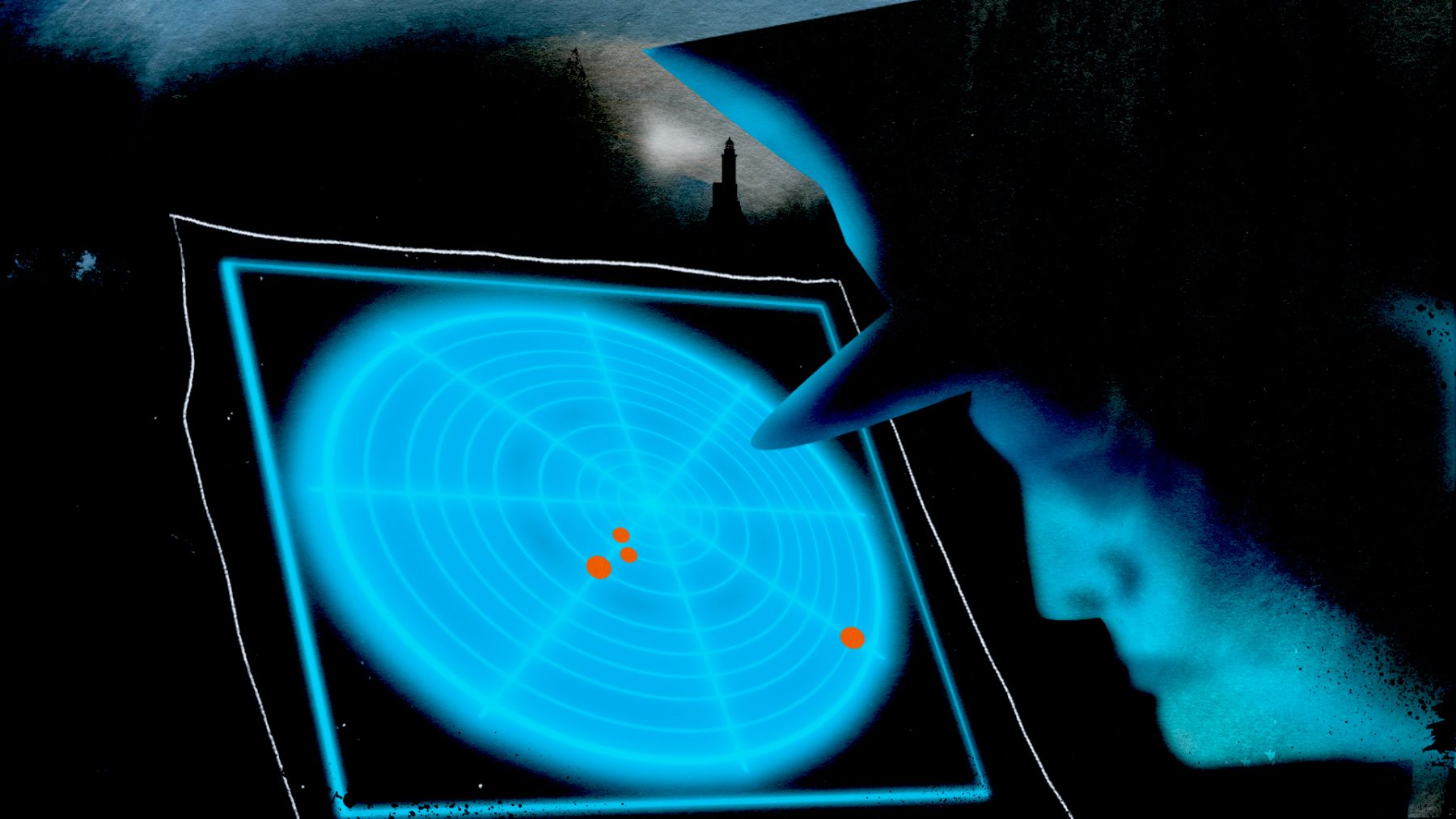
Ngo eventually made it to the other side of the Mediterranean, in another dinghy. We met him at a reception site for asylum seekers in northern Italy where he had befriended another asylum seeker — also from Cameroon. The two men fled the opposite sides of Cameroon’s civil war at more or less the same time. Ngo is from a French-speaking village and was forced to flee when his home was attacked by an English-speaking militia. His friend is an English-speaker and was a member of one of these same militias until his group was overrun by the Cameroonian military and he was forced to flee the country. But their paths have brought them together.
Both were able to flee Cameroon and make a home in Tunisia. For two years, Ngo worked as a car mechanic, while his friend worked in construction. Both lived in relative stability until, last February, they say they were forced to flee home, again.
In a televised speech on February 21, 2023, Tunisian President Kais Saied directly targeted Black Africans in Tunisia, referring to them as “hordes of illegal migrants” and charging them with carrying out “violence, crime and unacceptable actions.” Saied echoed the conspiracy theories of far-right political parties in both Tunisia and Italy, under Prime Minister Giorgia Meloni, that tie intracontinental immigration to a “criminal plan” to change the “demographic landscape.”
The speech triggered unrest across Tunisia, where Black people comprise about 10% to 15% of the population. Within days, many people from countries in sub-Saharan Africa who were living in Tunisia, as well as Black Tunisians, reported losing their jobs, being evicted from their homes and facing arbitrary detentions by the police and violent attacks by vigilante groups. After Saied’s speech, Ngo’s boss told him to go home and not to return. For the first time, Ngo considered leaving Tunisia.
“These attacks made many of us want to stay indoors all day, like a cat,” he said. “We couldn’t live in this condition — I was in Tunisia for two years and never imagined taking to the sea.”
“Everything changed after the president’s speech,” said Mohammed Salah, a refugee from Sudan who has lived in Tunisia since 2016. Salah hails from the Darfur region, which became the ground zero for a genocide carried out by Sudan’s notoriously brutal Janjaweed militia in the early 2000s. Granted refugee status in Tunisia two years after arriving, Salah has been working in construction ever since. But after Saied’s speech, he told us, “they fired me from my job, they kicked me out of my home. All because the president said that we don’t like Black people.”
Salah came to lead a movement of people that has, for two months, camped out in front of the offices of the U.N. High Commissioner for Refugees and the International Organization for Migration — in a plum neighborhood outside Tunis where many international organizations have their local headquarters. We spoke to Salah in April, just a few weeks after violence erupted in Khartoum, between the Sudanese army and the Janjaweed militia, which now calls itself the RSF. “I’ll go to Rwanda, to Europe, wherever,” Salah told us. “I just can’t go back to Sudan, especially now.”
Spotlight: Libya
ICMPD has been a key partner for the EU’s actions in Libya for years. Documents obtained via FOI shed light on these operations: In 2014, the organization published a white paper on the “legislative framework for migrant detention in Libya,” a strategy articulating how to better manage migration in Libya. ICMPD also began supplying technical equipment to Libya’s Interior Ministry, including for detention centers.
The Libyan Directorate for Combating Illegal Migration (DCIM) became infamous years later for the conditions inside its migration detention centers. Years of documentation from journalists and civil society organizations described a litany of abuses, solitary confinement, denial of water and food, torture, sale into enslavement and other human rights abuses that in 2018 the UN Human Rights agency called “unspeakable horrors.”
In March 2023, investigators from the UN published a report alleging numerous crimes against migrants carried out by Libyan authorities, including torture and enslavement. “There are reasonable grounds to believe migrants were enslaved in official detention centres well as ‘secret prisons,’ and that rape as a crime against humanity was committed,” wrote the UN investigators. “The ongoing, systematic, and widespread character of the crimes documented by the Mission strongly suggests that personnel and officials of the DCIM, at all levels of the hierarchy, are implicated.”
ICMPD documentation describes collaboration with the Libyan Directorate starting in 2014. The report goes on to assert that the Libyan Directorate “will be ICMPD’s primary counterpart in the project, as it has direct responsibility for the 19-20 detention centres in Libya.” Other program documents, also received through freedom of information requests, describe an ongoing collaboration with the Libyan Directorate. In those documents, it is repeatedly listed as a “key beneficiary” or a “target group” for European Union taxpayer money. In another document, a narrative report describing ICMPD operations in Libya between 2018 and 2019, the organization discusses its support for Libyan organizations to train DCIM agents. The training was aimed “Improving the rights of migrants in the detention/shelter centres by training agents of the ‘Anti-Illegal Immigration Agency.”
But traveling by sea is becoming an increasingly dangerous option for people like Salah, as the European Union expands its cooperation with the authorities in Tunisia, with the ICMPD serving as a middleman. Sources at human rights and development organizations told us they were concerned that European policy in Tunisia will follow that of neighboring Libya, where the bloc began providing support for a coast guard intended to intercept migrant boats in international waters and to bring them back to the country from which they had just fled. The EU has been internationally condemned for its support of the Libyan coast guard, border police and migrant detention system, which, since 2016, has detained tens of thousands of migrants under inhumane conditions. An investigation by Amnesty International presented ample evidence of migrants being subjected to torture, sexual violence and even extrajudicial killings.
Before 2020, the Tunisian coast guard had a humanitarian focus, explained Romdhane Ben Amor, the director of the Tunisian Forum for Economic and Social Rights, a Tunis-based human rights organization. But in the past three years — and, Ben Amor notes, since the EU began its support for the country’s border authorities — his organization has documented extensive human rights abuses at sea by the Tunisian coast guard, similar to those seen in Libya.
In 2019, the ICMPD began supporting the Tunisian coast guard with a host of technical equipment and training, paid for by the EU. They have radar, communications equipment and drones — everything they need to stop people from leaving Tunisia’s shores or to frighten them away.
A report by Ben Amor’s organization that will be published in June, to which we were given advanced access, details a pattern of abusive behavior by the Tunisian coast guard against migrants at sea. Dozens of interviews, including with shipwreck survivors and fishermen, demonstrate a pattern of abuse by the coast guard and show that it routinely fails to perform its duty to rescue migrants in distress. Researchers documented multiple incidents in which the coast guard deliberately provoked shipwrecks or stole motors from dinghies and left boats full of people adrift — which is exactly what happened to Ngo. The report offers figures that speak to the scale of these operations: Between January and April 2023, the Tunisian coast guard intercepted 19,719 migrants at sea. During the same period, 3,512 were arrested for “illegal stay.”
“The Europeans hide behind this organization,” Ben Amor told us. “So it’s not the European Union that does this, but it’s ICMPD, it’s an independent organization.”
“There is political pressure on the coast guard to prevent people from leaving, whatever the price, whatever the damage,” Ben Amor said. “That’s how the violence started, and the coast guard is responsible for a lot of violence.”

The ICMPD was established in 1993 in response to the fall of the Soviet Union. “We in Europe feared a mass invasion of Russians,” wrote Jonas Widgren, one of the ICMPD’s founders, in a 2002 academic paper. Widgren was frustrated by the lack of a coordinated response by European states to what he saw as a “never-ending asylum crisis.” At first, the ICMPD acted as a mix of a policy think tank and a diplomatic organization, facilitating dialogue among states on issues related to borders and migration and publishing policy briefs.
The organization grew steadily over the years, but the tipping point came in 2015, when more than one million people came to Europe having fled the civil war in Syria. That same year, the ICMPD appointed a new director, Michael Spindelegger, an Austrian conservative politician. According to multiple former colleagues and development insiders, Spindelegger had the political will and the right connections to, as one former employee put it, “make the most of the crisis.”
Spotlight: Bosnia
ICMPD has played an active role in the deportations taking place in the Western Balkans. In 2022 alone, 829 individuals were deported from Bosnia to countries like Bangladesh and Morocco. These deportations primarily targeted individuals who had been pushed back into Bosnia from Croatia, an EU member state that has been accused of engaging in violent deportations of asylum seekers.
Despite lacking deportation agreements with these countries, Bosnia’s Ministry of Security described the deportations as a result of “good bilateral relations.” ICMPD has even facilitated meetings between Bosnian authorities and third countries on migration and border-related matters, including deportation. According to a representative from Bosnia’s Ministry of Security, who we spoke to for this story, the budget for these deportations came from funds that were earmarked as “Instrument for Pre-accession Assistance.” This is EU money that is allocated to help prospective member states meet the requirements to join the European Union.
ICMPD is involved in the construction of a controversial “detention unit” within the Lipa migrant camp near Bosnia’s border with Croatia. Bosnian authorities have faced criticism from humanitarian organizations due to their handling of asylum procedures, characterized by lengthy waiting times, high rejection rates, and a lack of adherence to the rule of law. According to data from the UN refugee agency, out of the 27,000 individuals who entered the country in 2022, none were granted refugee status.
“The European Union wanted to look like it was throwing money and equipment at the problem, basically throwing money to stop migrants,” recalled one former senior ICMPD employee, who spoke to us on the condition of anonymity for fear of professional repercussions. “Suddenly, there was all this funding available, which included border management training but also included equipment,” they said. “The European Commission can't just hand over equipment to, say, the Moroccan government, so they need someone like the ICMPD to do it.” If the Commission were to try to push through this type of transaction without a middleman like the ICMPD, it would need the approval of the European Parliament. This can be hard to come by even in a favorable political climate. But the grim optics of reported abuses in Libya would likely draw unwanted scrutiny to the project and potentially jeopardize its approval.
Before coming to the ICMPD, Spindelegger held a series of top government jobs in Austria, including as finance minister and foreign minister. In 2015, he went on to chair the Agency for the Modernisation of Ukraine, a NGO funded by the pro-Russian Ukrainian businessman Dmytro Firtash. The following year, Spindelegger took the helm at the ICMPD.
Known for his neoliberal approach to migration policy, Spindelegger expanded the ICMPD into new regions and began training border guards and procuring technology and equipment for the police in most countries that border the EU bloc. With that expansion came a bigger budget, increasing from 16.7 million euros (about $18 million) in 2015 to 58 million euros ($62.2 million) in 2022. In 2022, 56% of the ICMPD’s budget came from the European Commission. Just three years ago, in 2020, the Commission provided 80% of the ICMPD’s budget.
Subscribe to our Authoritarian Tech newsletter
From biometrics to surveillance — when people in power abuse technology, the rest of us suffer. Written by Ellery Biddle.
“Our aim still is to be the go-to organisation for European states on all matters related to migration,” wrote Spindelegger in 2023. The organization also began running vaguely-defined “migrant resource centers,” primarily in South Asia and the Middle East, that appear to be focused on dissuading people from pursuing migration without documents.
The ICMPD operates for the European Commission under a funding scheme called “indirect management,” whereby EU work is outsourced to external agencies and the Commission isn’t involved in how projects are carried out. Several sources told us that this means the ICMPD isn’t subject to the same transparency and accountability measures that it would be otherwise.
“By externalizing this work to an organization outside of the European Union, the Commission is making this work far less accountable, working in a sort of legal gray area,” said Demirel, the German parliamentarian. “The farther this action is from European institutions, the less we can control it — Parliament can’t look at contracts from ICMPD.”
This disconnect is practical, said Jeff Crisp, who worked for the U.N. refugee agency for decades. He pointed to “serious ethical issues that ICMPD doesn’t seem to have addressed.”
“There is a disconnect between some of the language the organization uses and the activities it’s involved in,” said Crisp. “They are making things sound very technocratic and apparently quite neutral, whereas in fact they have very specific political purposes, which are often contradictory to human rights values.” Sources also expressed concern about the overlap between the ICMPD and the EU bureaucracy when it came to staffing. Six former ICMPD employees and European development insiders all described a revolving door of former European Commission employees coming to work at the ICMPD and vice versa.
A spokesperson for the European Commission told us that ICMPD operations “continuously undergo audits, assessments and evaluations with regard to their compliance with rules and regulations of the EU, including the respect of human rights.” The spokesperson did not address allegations that these operations are contributing to human rights violations.

Outside the office of the International Organization for Migration in Tunis, Tunisia’s capital, just over 100 people were still camped out in protest when we visited in April. The headquarters is surrounded by tall white gates, with a plaza containing a small tent city stretching down one side of the building. Three people argued with the security guard at the gate, while others sat in the shade of one of the plaza’s two palm trees.
One man from Guinea, who asked that his name be withheld for his safety, said he had been camped outside the IOM building to ask for medicine and a way out of the country. After the Tunisian president’s February speech, he was attacked by a group of locals who robbed him of all his belongings. When we met in April, his eye was still noticeably swollen.
“The first time I tried to leave, I was pulled back to shore,” he told us. “The second time, they stopped me on the shores and put me in prison for six months,” he said. He showed us a gap where his tooth once was, which he said he lost after being beaten by guards in prison. “Now I’ve lost it all.”
Ben Amor, the director of the Tunisian Forum for Economic and Social Rights, says this kind of indiscriminate violence has become commonplace for migrants and refugees throughout Tunisia, especially following Saied’s racist speech.
“We are in the middle of a humanitarian crisis in Tunisia,” Ben Amor said. “And at the same time, ICMPD continues its border management project here — so they equip the Tunisian coast guard with drones, with a radar and with other surveillance systems to keep people from leaving.”
“All of this work is being masked to look like protection,” said Gabriella Sanchez, a migration expert at Georgetown University. Sanchez argues that the European Union carries out border projects with the ICMPD and other third-party organizations deliberately, as a way of avoiding responsibility and accountability. “It is the creation of this illusion that by giving work to third parties, the EU isn’t directly involved and aren’t necessarily morally responsible for the consequences,” Sanchez told us.
With a border control budget that leapt from 12 billion euros (about $12.8 billion) in 2014-2020 to more than 23 billion ($24.6 billion) in 2021-2027, the European Union is almost literally doubling down on its efforts along the border.
Back at the reception site in northern Italy, Fabrice Ngo said he is lucky to have survived his journey over the sea. On the day of his rescue, the fisherman who spotted them attached a line to their metal dinghy and brought them back to the coast. From there, Ngo remembers, the fisherman went back out to find the other boats that had departed Sfax together with Ngo’s. It was then that he found out that the other boats had also been left without motors by the coast guard.
“They pulled back every boat except one. One boat refused the rescue, and they were left at sea,” Ngo remembered, shaking his head. “That’s how they shipwrecked. Many people died.”
The story you just read is a small piece of a complex and an ever-changing storyline that Coda covers relentlessly and with singular focus. But we can’t do it without your help. Show your support for journalism that stays on the story by becoming a member today. Coda Story is a 501(c)3 U.S. non-profit. Your contribution to Coda Story is tax deductible.
The Big Idea
Shifting Borders
-

When your body becomes the border
feature Erica Hellerstein
-

India and China draw a line in the snow
feature Shougat Dasgupta
-

How an EU-funded agency is working to keep migrants from reaching Europe
feature Zach Campbell and Lorenzo D'Agostino
-

Turkey uses journalists to silence critics in exile
feature Frankie Vetch






